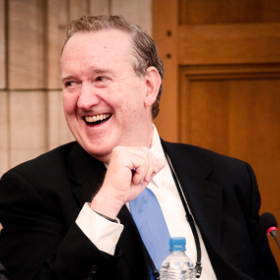
Breaking Down East West Stereotypes
When she initiated her partnership with the Institute for East West Security Studies (IEWSS), EWI's former name, on the Academic Board, Dr. Catherine McArdle Kelleher suspected that the Resident Fellows Program had the potential to become something exceptional.
The idea of bringing young leaders from Eastern Europe to work in partnership with a new generation of Western leaders inspired a revolutionary idealism. The extent of that idealism and the seeds of subsequent controversy, were revealed in full during an unusual conversation one afternoon some twenty years ago. As Dr. McArdle Kelleher remembers it, "I was sitting in a club in New York having lunch when I was approached by a man I had never met before. He was quite angry and demanded to know why I was working for an organization that was helping the communists? He was adamant that our Fellows were all spies and we were endangering our national security by partnering with these people." These days such scenes seem straight out of a dark comedy, but back then, such remonstrations were very serious business.
A generation later, the success of the Resident Fellows Program clearly speaks for itself. From its inception, the agenda was to build new ties, break down East-West stereotypes and open doors for Easterners to speak freely, outside the confines of the state security apparatus. The list of EWI alumni is both long and distinguished. Dr. Ion Pascu was a researcher in a government think tank in Bucharest when he became an EWI Fellow in 1985. In January of this year, he became his country's Minister of Defense. The first civilian Minister of Defense of democratic Poland, Andrzej Karkoszka, was also a Fellow. From London or Paris to Washington D.C., Kyiv or Moscow, the list of EWI alumni now in important government or public positions is long.
The philosophy behind the Resident Fellows Program is straightforward: exposing the future leaders of tomorrow to diverse ideas would enable them to decide what way of life is best for themselves and their nations. By emphasizing openness, the Institute will help minimize misunderstandings, which in the long run creates a far more peaceful world. The passions swirling around the controversies of providing an all-inclusive education to our "enemies" has long since dissipated. The tangible benefits remain for all to see. The products EWI Fellows produced were important; the process equally so.

